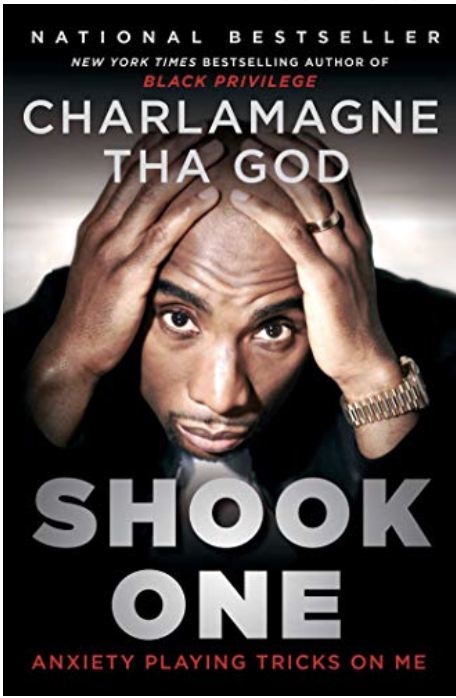I have to admit, I’ve never been a huge fan of Charlamagne. I knew he was a big name in the radio world and every now and then he would do something that would cross my radar – an interview with an artist that I adore, or a controversial statement that I felt compelled to weigh in on. But I have a complex about people who identify as a God so I largely ignored him. .. and I almost didn’t pick up this book. It kept coming up in book recommendations so finally I broke down and purchased it. I’m glad I did.
The name of the book is Shook One, but Anxiety is my superpower could have certainly been an appropriate choice as well. Charlamagne gives us a front row seat into his life, his mind, and his therapy sessions. This was a very open, raw account of his life clouded by anxiety. He gave us a real glimpse into how an anxiety riddled mind actually works. A simple, common fear can easily spiral into illogical, paralyzing worry. That is often further compounded when mixed with drugs/alcohol. For many, anxiety can be debilitating. Charlamagne doesn’t hide its existence or effects. Instead he has learned to not only survive with it .. he thrives. He’s learned how to take cues from his body and take appropriate time for self and family. He’s learned to embrace the blessings of his difference.
As a culture, the Black community has yet to openly and honestly accept the ideas and benefits of therapy. It was refreshing to see a Black man discuss the need, his experiences, and his rewards. He didn’t just sit back and say, therapy is great. Similar to my journey in Woke Up Dead, he takes you into a therapy session and sits you down right next to him. He, too, does a great job of demystifying the process. Therapy is not all couches and hypnotism. It’s normally just a guided conversation with a neutral trained party who helps you work through and process the issues. Therapy helps shed the weight of your past so you can walk confidently in your purpose and see the beauty of your future.
Charlamagne touched on many points including the Black Christian belief that there’s nothing wrong with you that prayer can’t heal .. or that your spiritual leader can’t guide you through. Never mind the fact that #churchhurt is real and at worse, spiritual leaders are in many instances the source of the pain. At best many are simply grossly ill-equipped to counsel the challenges of sexual abuse and trauma that runs rampant in many Black households. Sometimes it takes a neutral third party that is trained to deal with mental health stressors. Sometimes a persons issues do rise to the level of mental illness. Whatever the case is – grief, divorce, abuse, abandonment, caregiver stress, bipolar, schizophrenia – the issues that weigh on the mind and affect mental and physical health require special care .. and there is no shame in seeking the help you need.
In addition to touching on the Black Christian perspective, Charlamagne also refused to shy away from the reality of generational hurt/inherited trauma. Studies have shown that children of Holocaust survivors bear a stress gene that can’t be attributed to any other factor in their life other than their parents exposure to the Holocaust. If this is taken as truth, then we must also explore the impact that centuries of slavery, forced family separation, racism, pipeline to prison mission, unhealed sexual abuse, and a host of other factors that Black America has been forced to suffer through since being forcibly planted on this land.
I loved this book. It was bold and unapologetic in its message about how necessary therapy is needed in the Black community. This is an especially great read for Black men who arguably are the segment of our population who need therapy the most, yet seek it the least. The unique layout of this book was especially appealing. Each chapter starts out in Charlamagne’s voice, but was then followed up with a breakdown from a therapist who could take the experiences, thoughts, and reactions, and give us the medical overview of what happens in the brain and body. That aspect was absolutely genius.
I am so proud of this production. This is such beautiful way to further the conversation and remove the stigma of therapy. This is much needed not just in the Black community or in the US, but worldwide. We have to drop the stigma and talk about these issues so people are more comfortable seeking help. No one should be ashamed to want to heal.
Clearly, this is a book I strongly recommend. This book will hopefully resonate with the Black community and enlighten the White community. Pick up a few copies, pass them to friends and family members. Let’s have an honest discussion about the lessons highlighted. Then, let’s make 2020 the year we all seek healing so we can walk in the light.

